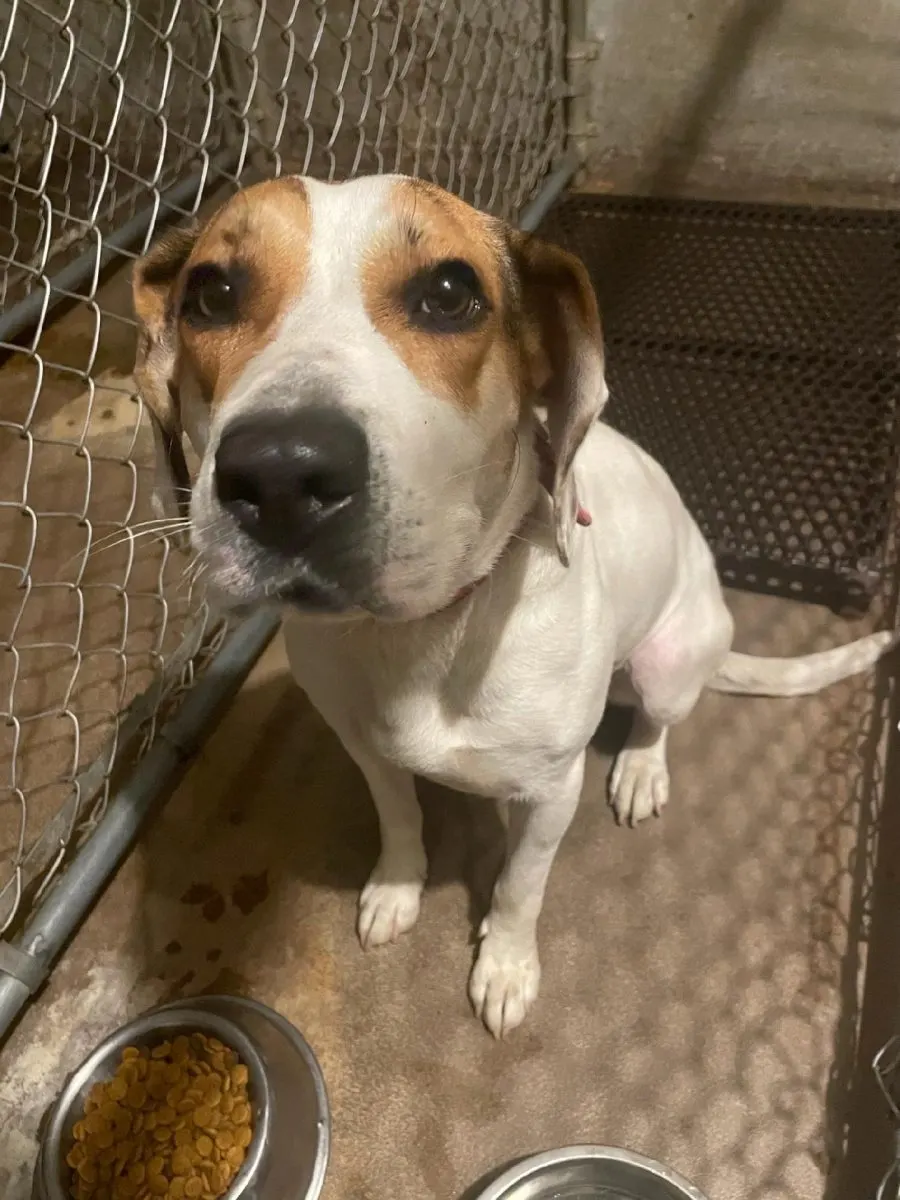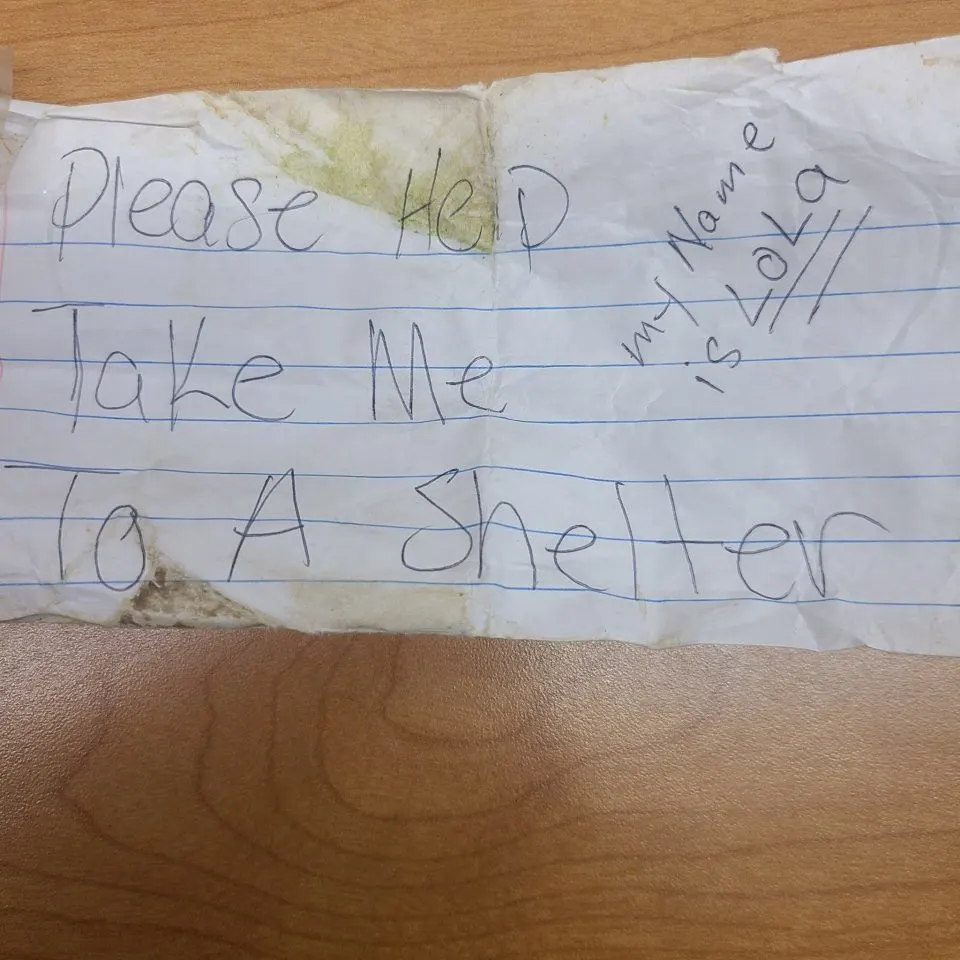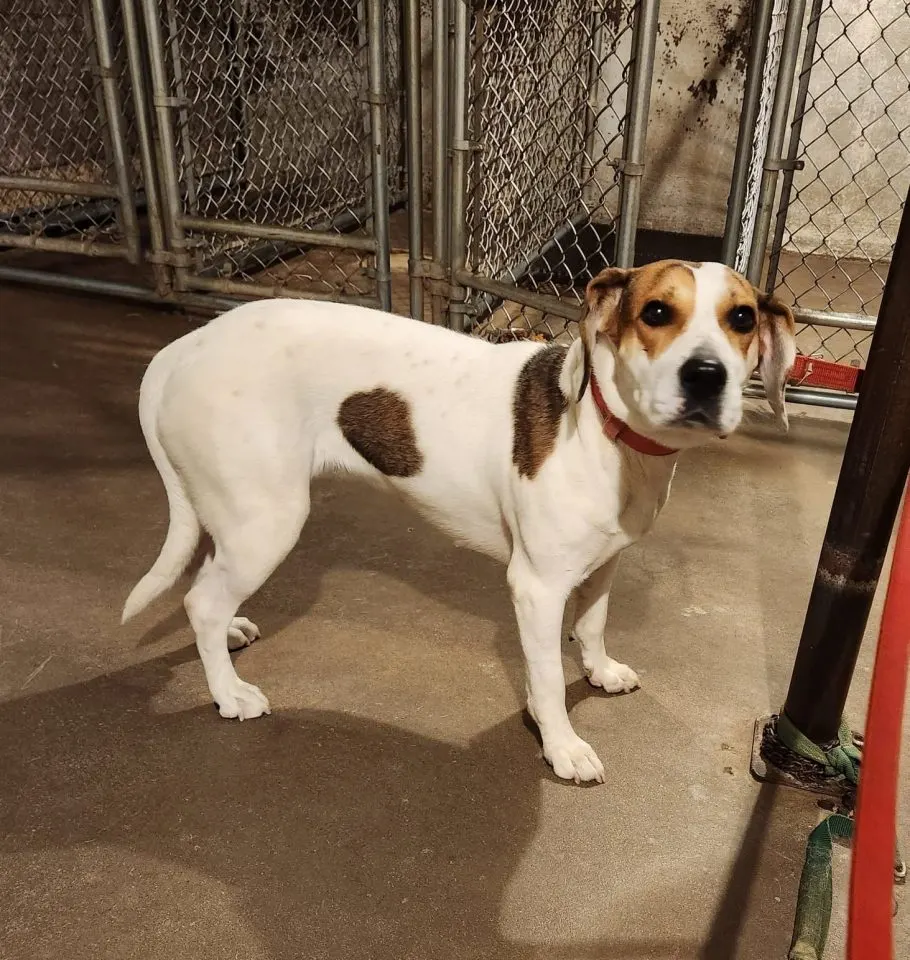A heart-wrenching incident that occurred in the city of Platteville, Wisconsin, sheds light on the ever-growing concern of stray and abandoned dogs that require immediate attention and efforts to ensure their safety and well-being.
Countless furry friends are being left to fend for themselves across the nation, each with a different past and a possibly traumatic experience.
Just like little Lola, who literally jumped at the opportunity to be saved.
‘Take Me To A Shelter…’

On the 25th of August 2023, the Platteville Police Department (PPD), in Wisconsin, posted about an abandoned dog in their city.
It is not uncommon for this police department to respond to a call regarding a loose animal; however, this particular instance was atypical as the dog was accompanied by a written note.
When the police officer arrived at Mound View Park and Campground, where the resident had spotted the loose dog, this female pup immediately jumped into the police car.
“This sweet girl came right over to the officer and jumped in the squad,” said in the Facebook post.
However, after examining the pup further, the police officer noticed something unusual about her. The pink collar around her neck seemed to have something attached to it.
“Upon further inspection, the officer discovered this note attached to the pink collar the dog was wearing,” the post added.
Attached to the collar of the dog was a handwritten note, which read:
“Please help. Take me to a shelter. My name is LOLA.”

Upon reading the note and looking at the dog’s soulful eyes, the officer couldn’t help but feel saddened by the whole situation.
This sweet girl was abandoned by her owners, which is, according to the municipal ordinance, illegal in Platteville.
Lola’s (P)Update
“We are asking for the public’s assistance in finding Lola’s original “owners”. We would like to speak with them. Thank you in advance,” the police department said.
Lola’s story grabbed the attention of the public, with everyone wondering what had happened to her and why someone would abandon her in such a way.
While the PPD investigated her background, Lola was transferred to Platteville Veterinary Clinic, which actively searched for her new forever home.

Luckily, it didn’t take long since only a week later, this precious girl was adopted.
Both the PPD and the veterinary clinic updated the public by saying that Lola was adopted and is headed to a fabulous new forever home.
Sweet Lola, we wish you nothing but happiness in your new home, and may you never be abandoned ever again.
*At the time of writing this article, no further information about the police investigation regarding Lola’s previous owner has been released.
If you’ve ever caught your furry friend munching on his own feces, you’re not alone. This common behavior can be puzzling and concerning for many dog owners. From puppies to seniors, dogs of all ages may engage in this less-than-appetizing habit. As a seasoned dog trainer, I’ve seen my fair share of dogs with this peculiar inclination.
While it may seem gross to us, there are various reasons why dogs exhibit this behavior. Understanding the underlying causes behind why your dog is eating his poop is essential in addressing and correcting this behavior. So, the next time you catch your canine companion in the act, know that there are ways to help curb this behavior and ensure your dog’s well-being.
Understanding Coprophagia in Dogs
The Definition and Basics
Coprophagia refers to the behavior of dogs consuming their feces. It is a common but unpleasant habit seen in some dogs. This behavior can be puzzling and concerning for dog owners, but it’s essential to understand why it occurs.
Common Triggers for Coprophagia
Several factors can trigger coprophagia in dogs. Some common reasons include:
- Nutritional deficiency: If your dog lacks certain nutrients in their diet, they may resort to eating feces as a way to compensate.
- Attention-seeking behavior: Dogs may engage in coprophagia to get attention, especially if scolded for defecating indoors.
- Stress or anxiety: Dogs experiencing stress or anxiety may exhibit coprophagia as a coping mechanism.
- Natural instinct: In some cases, consuming feces is a natural behavior inherited from wild ancestors.
- Medical issues: Certain medical conditions can lead to coprophagia, so it’s essential to rule out any underlying health issues with your veterinarian.
Understanding these triggers can help you address and correct coprophagia in your furry companion, promoting their overall well-being.
Health Implications of Poop Eating in Dogs
Nutritional Deficiencies and Concerns
When dogs eat their poop, it could signify that they are lacking essential nutrients in their diet. Some dogs may not be getting the necessary vitamins and minerals needed for their overall health. It’s essential to ensure your furry friend is on a well-balanced diet suitable for their age and size.
Potential Parasites and Diseases
Poop eating can also be a sign of underlying health issues such as parasites or diseases. Consuming feces can expose dogs to harmful parasites like worms or indicate digestive problems. Regular vet check-ups and fecal tests can help identify any potential health issues causing this behavior.
When to Consult a Veterinarian
If your dog continues to eat poop despite efforts to stop the behavior, it’s crucial to consult a veterinarian. Persistent coprophagia could indicate more serious health concerns that require professional evaluation. Your vet can provide tailored advice and treatment options to address the root cause of this behavior.
Behavioral Aspects of Dogs Eating Poop
When it comes to understanding why your dog eats poop, there are several behavioral aspects to consider:
Boredom and Anxiety
Boredom: Dogs may eat their poop out of boredom. If they are left alone for long periods without mental or physical stimulation, they might engage in coprophagia as a way to alleviate their boredom.
Anxiety: Dogs that experience anxiety or stress may also exhibit this behavior. Anxiety can trigger various unwanted habits, including poop eating.
Learned Behavior and Attention Seeking
Learned Behavior: Dogs are observant and can pick up behaviors from other dogs. If a dog sees another dog eating poop, they might imitate this behavior, considering it normal.
Attention Seeking: Dogs thrive on attention from their owners. If they notice that eating poop gets them extra attention, whether positive or negative, they might continue doing it to seek that attention.
Motherly Instincts in Females
Motherly Instincts: Female dogs, especially mothers, may eat their puppies’ feces as a way to keep the den clean and protect their young from predators. This behavior can sometimes extend to eating their stool or the poop of other dogs.
Understanding these behavioral aspects can help you address why your dog is eating poop and take appropriate measures to prevent or manage this behavior effectively. If you’re concerned about this behavior, consulting with a veterinarian can provide further insights and guidance on how to best support your furry friend’s well-being.
Prevention and Correction Strategies
Improving Your Dog’s Diet
To prevent your dog from eating poop, ensure they are getting a balanced diet rich in essential nutrients. Make sure their food meets their nutritional needs to curb any deficiencies that might drive them to consume feces.
Positive Reinforcement Training
Use positive reinforcement techniques to discourage poop-eating behavior. Reward your dog with treats or praise when they refrain from eating feces. Redirect their focus to more appropriate activities to reinforce positive behavior.
Environmental Management and Enrichment
Create a stimulating environment for your dog to prevent boredom and anxiety, which can lead to coprophagia. Provide plenty of toys, engage in regular exercise, and spend quality time with your furry friend to keep them mentally and physically active.
Coprophagia in Puppies Vs. Adult Dogs
Understanding the Differences
When it comes to coprophagia, or poop-eating, in dogs, there are notable variations between puppies and adult dogs. Puppies are more likely to engage in this behavior due to exploration and natural curiosity. They may also mimic their mother’s actions as they learn from her. However, for adult dogs, coprophagia can signal underlying issues such as medical problems, dietary deficiencies, or behavioral issues.
Age-Specific Solutions
For puppies, addressing coprophagia involves supervision, redirection, and early training. Providing a balanced diet rich in essential nutrients can help curb this behavior. Adult dogs, on the other hand, may benefit from a vet check-up to rule out any health issues. Ensuring their diet is nutritionally complete and addressing any behavioral concerns through training and environmental enrichment can help deter poop-eating tendencies.
By understanding the differences between puppies and adult dogs when it comes to coprophagia, you can tailor your approach to effectively address and mitigate this behavior. Whether you’re dealing with a curious puppy or an adult dog with underlying issues, proactive measures can help promote positive behaviors and overall well-being.
When Behavior Modification Might Not Work
Identifying Hard Cases
If your dog continues to eat their poop despite behavior modification efforts, they may fall into the category of hard cases. These cases can be more challenging to address and may require a different approach. Signs of a hard case include persistent coprophagia despite consistent training, a well-balanced diet, and a stimulating environment.
Seeking Professional Help
In situations where traditional methods have been ineffective, seeking help from a professional, such as a veterinarian or a dog behaviorist, is crucial. These experts can provide tailored strategies and advanced techniques to tackle coprophagia in dogs. They may conduct additional tests to rule out underlying health issues contributing to this behavior and offer specialized training programs to address your dog’s specific needs. Remember, it is essential to consult with professionals for the best outcomes in challenging cases.
Conclusion
Your furry friend’s poop-eating habit might seem bizarre, but there are various reasons behind it. From nutritional deficiencies and stress to learned behavior and instincts, coprophagia can have multiple triggers. Remember, a balanced diet and regular vet check-ups are crucial. While strategies like positive reinforcement and a stimulating environment can help, some cases may require professional intervention. If your dog continues to munch on poop despite your best efforts, don’t hesitate to seek expert advice from veterinarians or dog behaviorists. With tailored approaches and specialized training programs, you can tackle even the most challenging coprophagia cases effectively. Stay patient and proactive in addressing this behavior for a happier, healthier pup.
Frequently Asked Questions
What causes coprophagia in dogs?
Coprophagia in dogs can be caused by various factors, including nutritional deficiencies, stress, instincts, medical issues, boredom, anxiety, learned behavior, and motherly instincts.
How can coprophagia in dogs be prevented?
Preventing coprophagia in dogs involves providing a balanced diet, regular vet check-ups, consulting a veterinarian, improving the dog’s environment, positive reinforcement training, and addressing underlying medical conditions.
What should I do if my dog continues to eat feces despite training and a good environment?
If coprophagia persists despite training and environmental improvements, seeking help from veterinarians or dog behaviorists is recommended. They can offer tailored strategies, conduct tests to rule out health issues, and provide specialized training programs for challenging cases.
[no_toc]

Hey there, I’m Janet Brooks, a dog-loving student from California. I’m all about helping pups in need, especially those without homes. Me and my awesome friends work together to give shelter and love to stray dogs. Oh, and I also write blogs about dogs to share helpful info.